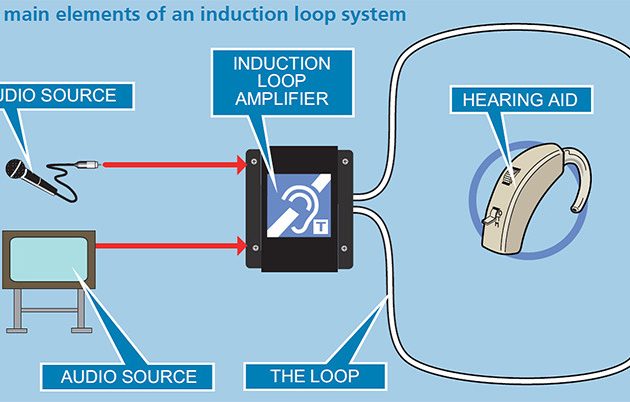
An induction loop helps people with hearing loss to hear much more easily in public places such as churches, theatres or even at home and can be used by anyone of any age.
Theatres. Places of worship. Retirement residences. Stadiums. Banquet rooms. Arenas. Airports. Waiting rooms. Funeral homes. Fitness classes. Dance halls. Classrooms. These are just some places in which people who use hearing devices struggle to hear because of background noise, reverberation and distance. Induction loop, or hearing loop, technology exists to help overcome these listening barriers.
Hearing loops offer people with hearing devices the most discreet amplification experience in a public setting. Listeners sit or stand inside the loop and turn on their telecoils to hear the sound. Sound clarity and speech intelligibility are greatly improved. Listening becomes less frustrating.
A hearing loop is a wire that is looped around a room, such as a theatre. The ends of the wire are attached to a special audio amplifier which can be connected to a microphone, TV, MP3 player, computer, stereo, public address system — just about any sound source. The looped area can be as small as a teller window at a bank or as large as a stadium. Hearing loop systems work indoors or outdoors.
A recently installed hearing loop at All Saints Anglican Church has been an affordable solution, said the Rev. Canon Chris Harwood-Jones
“It has been a simple and extraordinarily effective hearing-accessibility solution for our church,” he said. “People who had not heard the service properly in years were now able to hear every word.”
At Vernon Christian Fellowship, author and teacher Duane Harder said he is pleased with the performance of the hearing loop that has been installed at the church.
“After having personally benefited from the hearing loop, I am convinced it should be in every public building that facilitates the gathering of people,” he said.
David Moore, owner of Auris Hearing Loops Systems, said public venues often opt for infrared or FM systems because they are quicker to install.
“They are better than no system at all, but they are not as convenient for the venue or the listener and they are limited in the number of users that can use the system,” he said.
For people who use hearing aids, cochlear implants or bone-anchored hearing aids, sound can be sent directly from the hearing loop into their aids. A special part called a telecoil is required to pick up the signal from a loop. Many hearing aids come pre-equipped with telecoils, but not all.
Tosha Hodgson, registered audiologist and owner of Rockwell Audiology in Vernon, said hearing health professionals often hear complaints from clients who struggle to hear in public places even when they use their hearing aids.
“The noise and acoustics in many public places can be overwhelming,” she said. “Aids and implants can only help so much. Venue managers often don’t realize how much hearing device wearers struggle to hear in their facilities and how those patrons stop attending events because of their hearing challenges.”
A hearing loop will be installed at the Vernon library where a free seminar will be held Saturday from 2 p.m. to 4 p.m. Seating is limited so registration is required. Speakers will educate participants about: NexusBC; telecoils; hearing loops; maximizing speech-reading and listening skills to improve communication.
“Many people will not know if they have telecoils, so anyone who is unsure should ask their hearing care professional or contact me directly,” said Hodgson, who will check and program any hearing aid telecoils for free in her clinic before Saturday for seminar registrants.
People who have trouble hearing but are not using hearing aids can also hear the loop system using a portable receiver, and they should simply register for the seminar and bring their own earbuds or headphones.


9 Comments